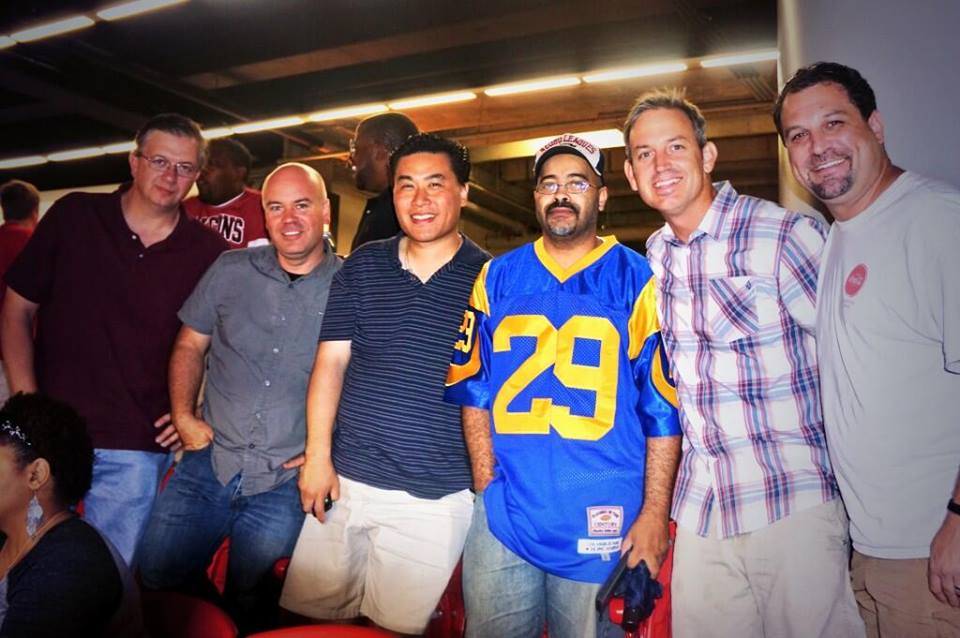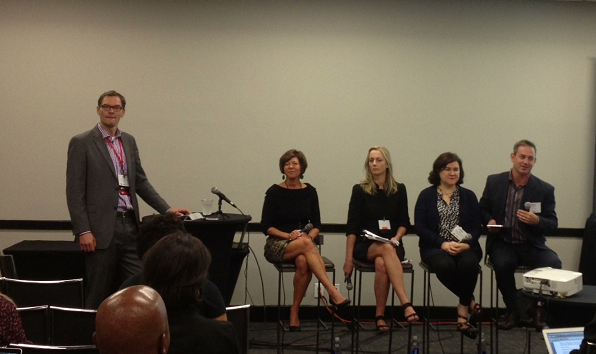We tapped on the window of a disinterested taxi driver and asked if he would take us to the stadium. He gave us “the tightlip”, and slowly accommodated us by opening each of the four doors. When asked how long it would take to get there, his thickly accented, Eeyore-like response was simply “We’ll find out”.
Laughter broke out.
Forty five minutes later, the Atlanta Falcon’s RB Stephen Jackson stumbled into the endzone against his former team to the deafening roar of the Georgia Dome that my friend and Atlanta local Dave Ryan hilariously describes as “part rap concert, part strip club, and part video game”.
As the flow of the game took over, and less exciting moments ensued, I began to consider why 60,000 people would pay a hundred dollars or more per person to come here when the view and convenience of watching a game with a 60 inch High Definition may arguably be better.
And why was I even here in Atlanta in the first place? I mean, other than to be amused by a cacophony of jeers and comments directed at the leader of our entourage, Brent Leary, who on this day was a bold and lonely Eric-Dickerson-jersey-wearing Rams fan, in a sea of red and black.

Left to Right: Joe Hughes, Accenture, Craig Downing, SAP, Ray Wang, Constellation Research, Brent Leary, Brian Vellmure, Bryan Kramer
In a seeming twist of irony, I had flown to congregate with hundreds of digital leaders who regularly trumpet the benefits of social media. Wouldn’t social media have been a better channel, err… platform to talk about social media?
With all this access to devices and media, why are people still spending gobs of money and time to do things the old-fashioned way and meet with people?
Right or wrong, we’re increasingly in pursuit of what’s scarce and unique. The chance to meet with a high density of folks committed to your interest and passion is difficult to duplicate, and for most people, it’s rare. It’s how relationships are formed and accelerated. Relationships and the trust within them are how business gets done.
In a ever growing sea of content, it’s the exceptional that gets amplified. Unique, helpful, remarkable is what gets shared. But as access to news, books, blogs, media, becomes more ubiquitous, unique, helpful, and remarkable is becoming rarer.
The Real Purpose of this Post
I was privileged to be a panelist on a session titled “Can you build a better advocate through social media?”, with Anneke Seley, Emily Yellin, and Natascha Thomson, moderated by Kai Petzelt, and creatively crowdsourced by SAP.
The session title introduces an important question – “Can you build a better advocate through social media?”
The real answers, I believe, has little to do with social media and most everything to do with psychology, sociology, and the fundamentals of what drives human behavior. There was some great dialogue about incentives, behaviors, and empowerment for advocates.
So far mentioned in this panel discussion: @bjfogg @danariely @DanielPink #ssuadvocate
— Ric Dragon (@RicDragon) September 17, 2013
The same thing that drove people to attend a professional sporting event, is a similar thing that drove people to attend a social media focused business conference, and perhaps more importantly, the same thing that drove hundreds and thousands of them to share their experience(s) of both on social networks.
The common thread is that the experience is somewhat remarkable, different, and unique from most people’s day to day. (Successful) sharing happens based on the merit of your product, service, and/or content. Apple is one of the most mentioned and shared brands on social channels, yet they do very little proactively on social media. Their masses use social media to propagate their own messages and affinity for the iconic brand. Would a focused program on amplifying and accelerating these messages help? Likely. But the lack of a proactive didn’t stop over 5 million social mentions about the launch of iOS7.
@BrianVellmure quoted by @jasondominy #ssuadvocate #SocialShakeUp pic.twitter.com/NqbNJPwrWf
— Naully Nicolas (@naullyn) September 17, 2013
You may have heard the controversial saying “Advertising is a tax for being unremarkable”. I love that quote. It’s not universally true, nor is it gospel. However, it’s a mental anchor that properly frames what successful organizations already know. We can’t just shout louder to increase revenue. The return on advertising spend offers diminishing returns as we broaden to less targeted channels. At some point, you’re pushing on a string. In a more fragmented world where long tails dominate, this rings truer than ever before.
Conversely, everywhere I look, I’m actually seeing and hearing about increased social media advertising budgets. Advertising is paying for privilege, for immediate access to an audience. It’s a “reach accelerator”. It works, and determining the right mix of owned, earned, and paid is still a top priority for marketers. In a socially connected world, amplifying the remarkable happens at exponential speed. Coupling the speed and reach of digital networks with something that is truly worth talking about is a match made in heaven.
The Valid Counterargument
The counterargument that I’ve heard several times before and was presented by a fellow panelist is that in some cases, being remarkable just isn’t practical, so how do we amplify what we’ve got? It’s a very common, real and practical question. The problem is that if you’re not remarkable, or unique, or constantly adding value, you’re done. Markets will gobble you up as evidenced by the struggling list of the 65 US companies that were on the Fortune 500 in 2003 and are not there today.
As I learned early on in sports; “If you’re not getting better, you’re getting worse”. Someone else is working harder than you are right now. Other organizations increasingly have access to your talent, your customers, your capabilities. It’s why the turnover rate in the Fortune 500, S&P 500, and every measure of corporate “who’s who” continues to get faster.
Yelling louder about mediocre offerings (message, service, or product), simply isn’t the answer. I’d gladly take an 80% return (80/20 rule) on a rapidly growing pie, than focusing on tactics to move our response and conversion rates a few percentage points on a stagnant or shrinking pie.
*** Have some thoughts about customer advocacy or advocacy on Social Media? Sound off here. It’s an important topic and we’re collectively still in the process of understanding more about it.
Robin Carey and the Social Media Today team deserve huge props for putting on a great event. Below is some other feedback from the Twitterverse during the session:
Love this RT @jasondominy: "It's not just about being remarkable, you have to market the remarkable." @nathomson #ssuadvocate #SocialShakeUp
— PeopleLinx (@PeopleLinx) September 17, 2013
"You have to pay attention to influencers, but don't do that to the exclusion of everyone else." @EYellin #SocialShakeUp #ssuadvocate
— Dan Gingiss (@dgingiss) September 17, 2013
Good discussion about the integrity of advocates & advocacy at #ssuadvocate panel. Thx all. #SocialShakeUp
— Sam Fiorella (@samfiorella) September 17, 2013
This panel is amazing, in that they are truly challenging each other one very thought. #ssuadvocate #SocialShakeUp
— Jason Dominy (@jasondominy) September 17, 2013
Real discussion taking place here on advocates #ssuadvocate #socialshakeup via @MarchellGillis <no surprise, these are real thought leaders
— Margot Heiligman (@mheiligman) September 17, 2013
Build a better advocate ROCKED!! Great interactive throw down! #ssuadvocate #SocialShakeUp
— Cay (@CayBee22) September 17, 2013
